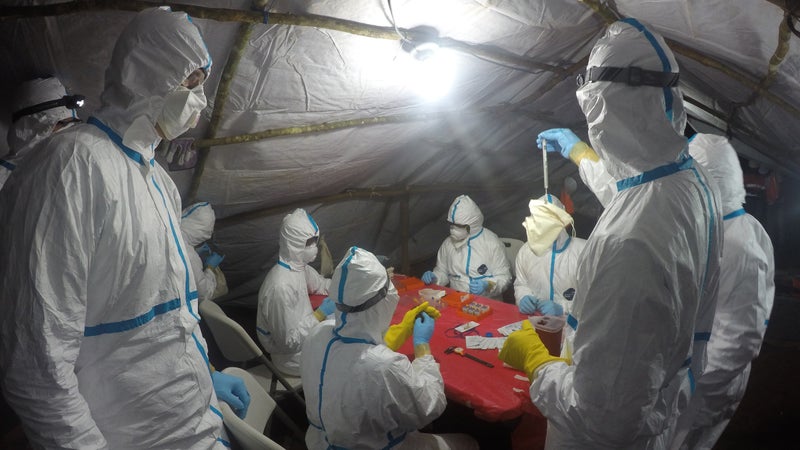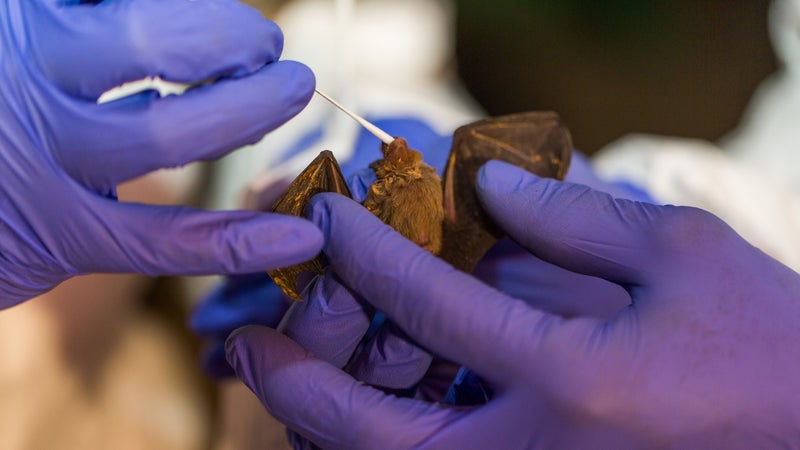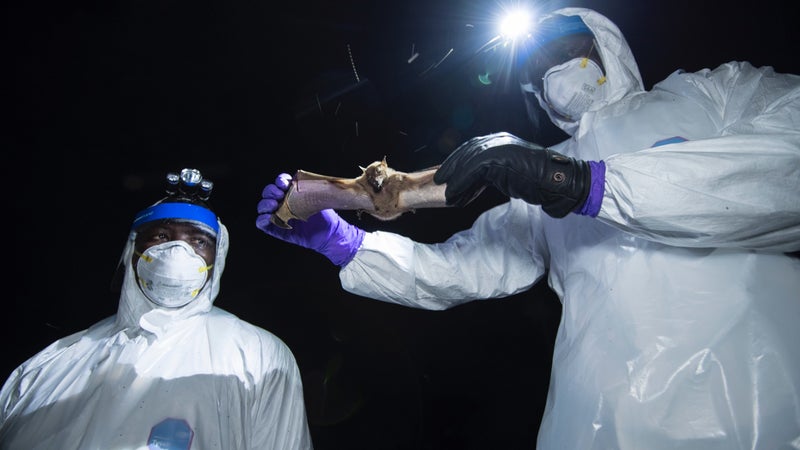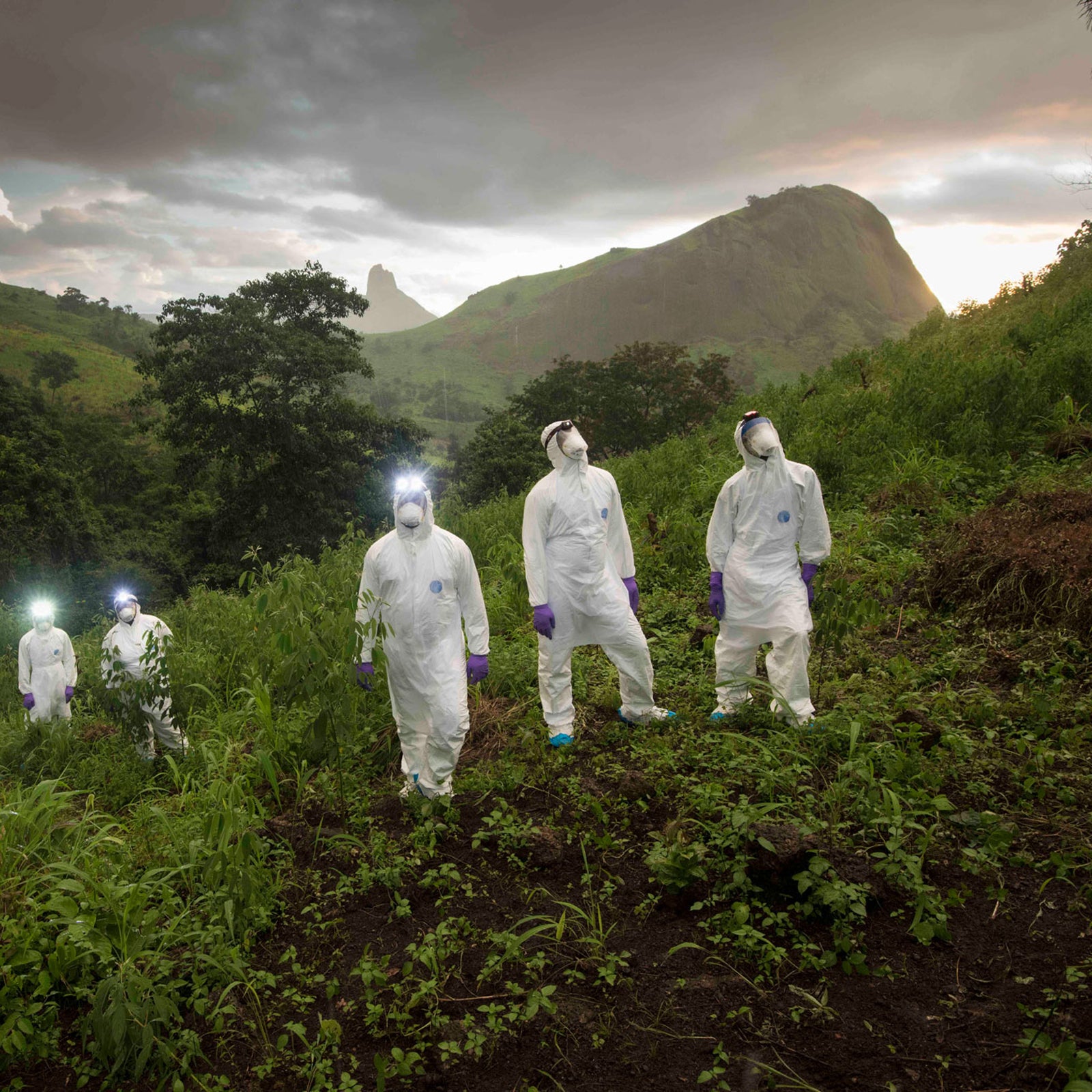In late July╠řof 2016, more than a dozen╠řLiberian researchers set up a makeshift lab at the edge of the╠řrainforest in their nationÔÇÖs╠řnorthern╠ř, which shares the╠řborder with╠řGuinea. Liberia is home to╠ř╠řand╠řhouses some of the worldÔÇÖs rarest animal╠řspecies, including the Liberian mongoose and pygmy hippos. But Jackson Poultolnor and the other researchers, all clad in╠řrubber boots, N95 masks,╠řface shields, leather welding gloves, and╠řTyvek suits, were there for bats.╠ř
Bats have been a source of food in Africa and other parts of the planet╠řfor thousands of years.╠řWhen Poultolnor╠řwas a child, his╠řmother╠řprepared the meat in a sweet stew for him and his eight siblings. But the mammal╠řis also a reservoir of pathogens and to be the source of the 2013 Ebola virus outbreak, which led to more than 11,000 deaths across this region. So╠řPoultolnor and his team╠řventured into the╠řdense vegetation to bind mist nets to╠řtrees in order to capture and study the animal. It was LiberiaÔÇÖs first╠řwildlife-surveillance operation, and it was conducted as a part╠řof╠ř, an organization launched in 2009 by the╠řU.S. Agency for International DevelopmentÔÇÖs╠ř(USAID)╠ř╠řto monitor infectious diseases.╠ř

Since the organizationÔÇÖs inception,╠řAmerican epidemiologists and sociologists have trained over╠ř6,000 researchers in more than 30 developing countries to seek╠řout zoonotic diseases in wildlife and╠řcollaborate╠řwith local officials╠řto head off new outbreaks. Predict teams across the globe have discovered , including Ebola viruses and SARS-like coronaviruses.╠ř
In January╠ř2019, after sampling over 5,000 bats╠řevery two╠řweeks╠řfor more than two years, the Liberian Predict╠řteam found for Ebola. It was the first time the type of Ebola virus responsible for the 2013╠řepidemic was detected in a Liberian bat. The discovery could help scientists learn more about how that virus infected humans╠řand, by extension, how to prevent other zoonotic diseases with pandemic potential╠řfrom spreading.
A few months later, in the fall of 2019,╠řthe Trump administration for Predict, leaving more than ╠řaround the world in limbo.╠ř
At the heart of the Predict╠řproject are the principles laid out by the , which seeks to foster collaborations between professionals in various science fields╠řthat will benefit the╠řwell-being of humans, animals, and the environment.
ItÔÇÖs an all-in-one philosophy that has deep historical roots. HinduismÔÇÖs ahimsa dictates that all living things are sacred because they are part of God and the natural world. Totemism, popular among may African tribes, posits╠řa kinship between humans and╠řwildlife.╠řSimilarly, One Health,╠řwhich was started by╠řveterinarians and doctors in the United States , looks╠řto understand the human-wildlife interface,╠řencouraging╠řinterdisciplinary collaborations in governent and academia, discouraging human encroachment╠řon natural habitats, and calling╠řfor the extensive surveillance of pathogens.╠ř
╠ř
There are ╠řlurking in animal hosts across the globe, and more than 650,000 have the potential to╠řinfect people, according to researchers at the at the University of California at╠řDavis. In fact, nearly 75 percent of the diseases affecting humans today stem╠řfrom wildlife. SARS-CoV-2, the virus responsible for the current pandemic,╠řis thought to have originated in bats and believed to have been╠řtransmitted╠řto humans via at an open-air market in Wuhan, China.
In addition to the vast number of viruses, scientists at the One Health Institute╠řsay╠řthat viruses╠řare also╠řmutating faster than ever. Urbanization and climate change, as well as activities like logging, poaching, and╠řanimal╠řtrafficking, have shrunk and fragmented natural habitats, which in turn has led to╠řincreased╠řcontact between humans and wildlife and more opportunities for viral mutation.╠ř
ÔÇťTrying to find these viruses in the wild is like finding a needle in a haystack,ÔÇŁ says╠ř, an American field veterinarian who was appointed by the Obama administration to lead Predict╠řin Liberia. That doesnÔÇÖt mean itÔÇÖs worthless to try. Although it cost $20 million to operate Predict╠řeach year, some have estimated that the current╠řCOVID-19╠řoutbreak could cost the world . A future pandemic could cost much more.

Though Predict╠řfailed to identify╠řthe virus that results in╠řCOVID-19,╠řa Predict-supported publication by scientists at the Wuhan Institute of Virology back in 2015 warned about in China and Southeast Asia.╠ř
On April 1, as confirmed cases of COVID-19 surpassed one╠řmillion in the U.S.╠řand three╠řmillion worldwide, Predict╠řreceived ╠řfrom USAID to focus╠řon the coronavirus. But the money was far from enough to host teams in different countries.╠řLuckily, in May, USAID announced a new project:╠řset to launch this╠řSeptember,╠ř will leverage the data collected by Predict╠řto develop interventions that will╠řreduce the risk of the transmission of dangerous pathogens passing from animals to people.
For too long, when it comes to disease outbreaks, thereÔÇÖs been a cycle of panic (as threats ramp up) and neglect (when they subside), says╠řTierra Smiley Evans, a wildlife veterinarian and epidemiologist at the One Health Institute. She hopes this pandemic will result in something different. ÔÇťWe canÔÇÖt leave a single country out in understanding the importance of the connection between human and animal health and working together on the prevention of the next pandemic,ÔÇŁ she says. ÔÇťThrough the tragedy that is happening now to the planet, I hope we come out stronger on the other end.ÔÇŁ


